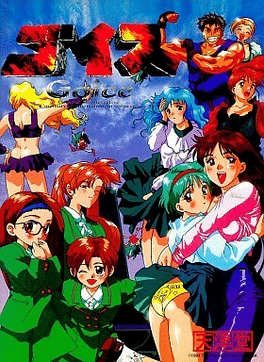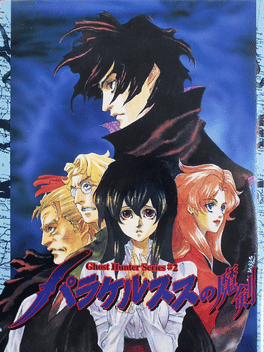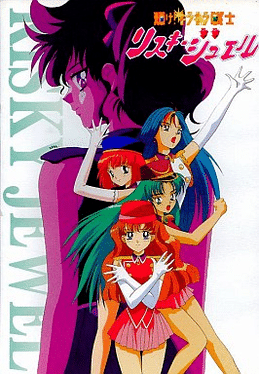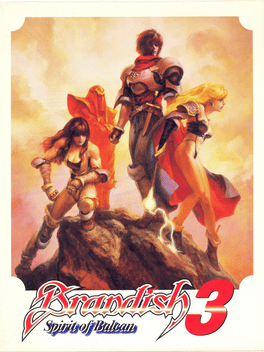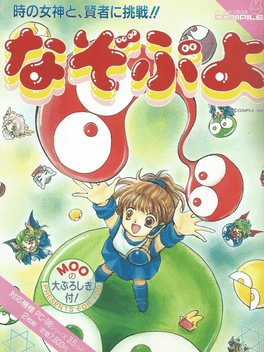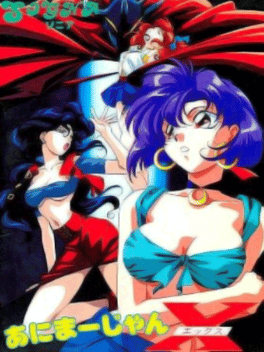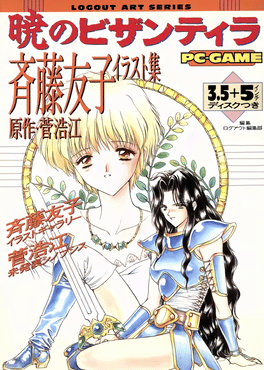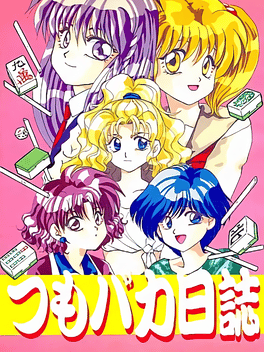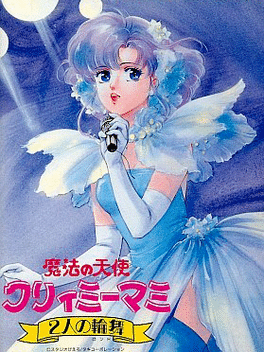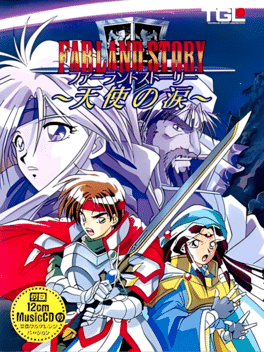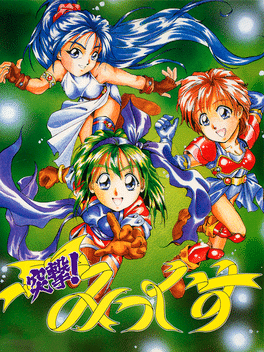New Pc 9800 Series Games - Page 6
-
Goice
1994
Goice
1994
Goice is an Action game, developed and published by Tenshindou, which was released in Japan in 1994. -
Paracelsus no Maken
1994
Paracelsus no Maken
1994
A horror themed dungeon crawler, and sequel to Laplace no Ma, released in 1994 on the NEC PC-98 by Humming Bird Soft. Travel across Europe to fight various secret societies, vampires, werewolves, and other monsters and uncover a dark conspiracy that could spell the end of the world. -
VG II: The Bout of Cabalistic Goddess
1994
After the six girls of the Jahana group have concluded their Variable Geo tournament, a girl named Kotoe Kashima, who happens to be the childhood rival of Reimi Jahana, has organized a new tournament, called "Bout of Cabalistic Goddess". The tournament is once again sponsored by a chain of restaurants, with famous martial artists working there as waitresses. The player chooses one of the six girls of the Jahana group and has once again to defeat all the others in battle before fighting Kotoe and her bodyguards. The Bout of Cabalistic Goddess is the second game in the Variable Geo series. It follows the same gameplay template as its predecessor: the player has to fight the other girls in a pre-determined order, winning two rounds out of three. There are five new girls to fight in this sequel. As before, the defeated fighters undergo various humiliating treatments of sexual nature. There are now three erotic scenes per girl, but it's possible to see them only after winning the whole battle, not one scene per round, -
Nazo Puyo
1994
Nazo Puyo
1994
Nazo Puyo is a Puyo Puyo spinoff for the NEC PC-9801. It is an expanded version of the Nazo Puyo mode featured in the PC-98 port of Puyo Puyo (1992). -
Farland Story: Shirogane no Tsubasa
1994
Chronologically the fourth Farland Story game, "Shirogane no Tsubasa" makes a fresh start story-wise, bring the first Farland Story not to deal with the hero Arc and his friends. In this game, you follow the destiny of a rebel group, who had to flee from the evil despot Pepper. Led by the cat-man Darland and the fugitive Phir, the rebels must overcome all possible obstacles in order to put an end to the evil reign and to restore peace in the land. Although the game has a different story, it still looks and plays more or less the same way as the first three Farland Story games. The game consists of strategic battles, during which you navigate your party members in turn-based mode over the map, attacking enemies when they are in range, and casting spells. Various type of terrain influences your attacks. For example, if you position your character on a square with a castle, his/her HP will be healed. -
Bomber Quest
1994
Bomber Quest
1994
Bomber Quest has elements of both strategy/puzzle game and RPG. Each of the six girls has a different scenario, accessible from the beginning. Each scenario puts the player character into a top-down environment. Shounosuke has to build a maze to access its locations. The maze is built from small pieces taken from Tetris. The player can rotate the pieces and then place them onto the ground. The goal is to build a maze that would cover possibly large ground, gaining access to important locations and items. Visiting uncovered locations in the right order leads to cut scenes, which advance the plot. -
Gensei Fukyo Den
1994
Gensei Fukyo Den
1994
Gensei Fūkyō Den is a Japanese RPG with a somewhat "light" approach, both in story-telling and gameplay. The gameplay mostly follows the standard procedure of Japanese-style RPGs, although some features are simplified: there is no "world map", and town navigation is menu-based. Most of the gameplay consists of navigating maze-like top-down dungeons, fighting random enemies in turn-based first-person perspective combat. Characters use special points (SP) for powerful attacks and magic points (MP) for spells. Released through Disc Station Vol. 4 in 1994 for PC-9801. -
Progenitor
1994
Progenitor
1994
Progenitor is a space adventure/strategy game. You play as Kenny, a space pirate searching for his long-lost father. There are over a dozen explorable planets where you can buy and sell goods and perform tasks. Demand for goods (and their prices) change based on the characteristics of the planet you're on. -
Animahjong X
1994
Animahjong X
1994
The sequel to Animahjong V3. When the events of this game occur the playable protagonist in the first game is now close friends with the three mahjong playing sisters and has even begun dating the eldest, Yumika. In this story, Rumi is kidnapped while walking home from school one day and the player must search for the clues that will reunite the family. Playing the role of the male protagonist or either of Rumi's older sisters, Yumika and Miyabi, you compete against several female mahjong players who have information on Rumi's whereabouts. As they get closer to finding Rumi, Yumika grows increasingly suspicious... -
Yuuwaku no Toiki
1994
Yuuwaku no Toiki
1994
Tetsuya is a 4th grade college student who takes up a part-time job to tutor one of the daughters of a famous novelist in his mansion. But for a salary of 1 million yen per month he also agrees to serve as bodyguard to novelist's wife Ayako whose life is endangered by an unknown person. -
Akatsuki no Bizantira
1994
In a world with two moons, humans peacefully co-exist with various species of intelligent animals, called "mebu". But something has destroyed the balance in that world, and animals have started to attack humans. A female warrior named Bizantira, accompanied by the yellow bird Diel, decides to find out the reason behind these occurrences and to discover the truth about humans and mebu. The game is a very basic Japanese-style RPG, with minimal story development and simple gameplay mechanics. The player controls Bizantira as she wanders around the top-down world map, exploring the world and visiting towns. There is no navigation in the towns; locations (such as weapons shop, inn, etc.) are selected through a menu. The battles are random, turn-based, and are viewed from first-person perspective. The game's story is based on a fantasy novel of the same name by Hiroe Suga. -
Tsumobaka Nisshi
1994
Tsumobaka Nisshi
1994
You play a long-haired salaryman as he visits random clubs to play in 4-player mahjong against girls, who strip if they run out of funds. The games don't end until you either strip all of the girls or run out of funds yourself. -
Gibo: Sayaka
1994
Gibo: Sayaka
1994
Sayaka Kimura is a twenty-six year old women married to an older man who has two teenage children, a boy and a girl. Controlling different members of this household, the player follows a plot that mostly consists of sexual encounters of various kinds. Gibo: Sayaka plays mostly like a visual novel, with sparse movement and interaction, usually comprising context-specific action and dialogue choices. Most of the game is dedicated to sex scenes during which the player has to repeatedly go through the choices to trigger new ones and eventually conclude the scene. -
Creamy Mami: Futari no Rondo
1994
Based on the anime Creamy Mami, the Magic Angel. The original tells the story of a 10-year-old girl named Yuu Morisawa, who gains a magical ability to transform into a grown-up young woman, eventually becoming a pop star and acquainting the inhabitants of the Earth with the rest of the galaxy. Yuu appears in the game, but is not the protagonist; the player controls four young women in four different scenarios: two of them, Yuri and Aya, on the Earth, and the other two, Ora and Sita, in an alien world, mixture of sci-fi and medieval fantasy. The story goes beyond the original anime by introducing a magical, sacred land known as Finality, populated by fantasy being, and calling the guardians (the four girl protagonist) to bring peace to the galaxy. Futatsu no Sekai plays automatically for the most part, except key scenes which allow interaction - two, sometimes more choices that have to be done by the player. In many cases these choices are merely cosmetic, or may lead to a different text description and scene. -
Farland Story: Tenshi no Namida
1994
Farland Story: Tenshi no Namida is a sequel to Farland Story II, released in mid 1994. The third in the row of Farland Story games, this title looks and plays very similarly to the first two games. You navigate your party over the world map in turn-based fashion. After you have assigned commands to your party members, it is the enemies' turn. You can attack physically when enemies are in range of your weapon, or cast spells - each character in your party belongs to a certain class and specializes in different type of combat. You gain experience points directly from hitting an enemy, even while counter-attacking, and can therefore level up in the middle of a battle. -
Totsugeki! Mix
1994
Totsugeki! Mix
1994
Totsugeki! Mix is a cute action platform game. Choosing one of the three girls, each with their own unique weapon, the player must travel through ten different stages fighting Galuf's unreasonably cute army. There are several different special magic powers that can be collected, including a fairy familiar, magic shield, and time slow, and a boss waits at the end of each stage. -
Jikuu Sasatsukan Hayate: Inspector
1994
In the future, after the latest World War, various nations of the Earth joined forces and built a super-powerful computer knows as "Juno", which would be able to preserve peace and to help scientists in their researches. Every four years, a fighting tournament is held by the company that built the computer. The rules of the tournament are strange: female fighters who lose agree to perform services of sexual nature. The Time and Space Investigation office decides to find out what really happens there, and sends a young employee named Hayate to participate in the tournament... Jikuu Sasatsukan Hayate: Inspector is a one-on-one fighting game. There is an exercise mode, but it only allows to fight one opponent on an easier difficulty level. In the "normal mode", the difficulty is higher, and all the fights are dictated by the story; it's impossible to choose player-controlled fighters, opponents, scenario, etc. Every battle has just one round. The fighters can use various punches and kicks, jump, and execute powerful s -
Sword Dancer: Kyoujin no Megami
1994
Goddess of the Evil Blade is a direct sequel to the first Sword Dancer. The story continues to chronicle the adventures of the "sword dancer" Hien and his mentor, the warrior Tetsuta. They have succeeded in rescuing the "white dragon sorceress" Setsuna from the clutches of the demons. However, greater challenges await the three. Setsuna's life might be in danger, and the watchful eye of the evil Black Dragon continues to follow the heroes. The adherents of the benevolent White Dragon have to prepare for the decisive battle against the forces of evil... The game plays very similarly to its predecessor. The overall structure corresponds to that of a traditional Japanese RPG: the player navigates the heroes through top-down environments, buying supplies in town, advancing the narrative in a linear way, and fighting enemies to gain experience and level up automatically. Like in the first game, the battles are action sequences that take place in small side-scrolling areas, similarly to fighting games. However, unlike i
